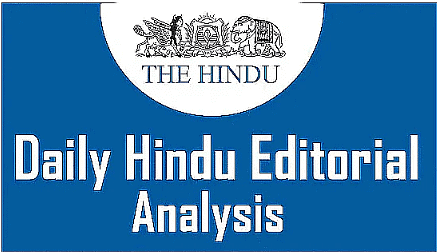The Hindu Editorial Analysis- 14th January 2023 | Current Affairs & Hindu Analysis: Daily, Weekly & Monthly - UPSC PDF Download

Bound supremacy
Context
It is fairly well-known that parliamentary le- gislation is subject to two limitations under the Constitution of India. One is by judicial review, or the power of constitutional courts to review legislation for possible violation of any fundamental right.
- Parliamentary sovereignty alludes to the notion that parliament is superior to the executive and judicial arms of government and so has the power to adopt or repeal any law. Any past legislation may be changed or repealed by the sovereign legislature, which is not bound by any written law, such as the constitution.
In India, there is constitutional sovereignty rather than parliamentary sovereignty. The Indian Constitution puts limitations on all organs of the state.
Limitations on the Sovereignty of Indian ParliamentThe Indian Parliament, on the other hand, cannot be considered a sovereign body in the same way since its authority and jurisdiction are limited by 'legal' constraints. The following considerations restrict the Indian Parliament's sovereignty:
Written Nature of the Constitution- India’s Constitution is the supreme law of the land, which outlines the power and jurisdiction of the Union Government's three organs, namely the legislature, the executive, and the judiciary, as well as the nature of their connection.
- As a result, the Parliament must act within the constraints set forth by the Constitution.
- There is also a legal distinction between the Parliament's legislative authority and its constituent authority. The ratification of half of the states is necessary to implement certain constitutional revisions. In Britain, on the other hand, neither the Constitution nor anything resembling a basic law of the nation exists.
- India is governed by a federal system with a constitutional separation of powers between the Union and the states in which both must stay inside their domains of influence.
- As a result, Parliament's legislative competence is limited to the topics included in the Union List and Concurrent List and does not extend to the subjects listed in the State List (unless in five exceptional cases and only for a limited time).
- The United Kingdom, on the other hand, has a unitary government, which means that all authorities are concentrated in the centre.
- Indian Parliament's supremacy is also limited by the establishment of an independent judiciary with the power of judicial review.
- If the legislation established by Parliament violates any provision of the Constitution, the Supreme Court and High Courts can declare them invalid and ultra vires (unconstitutional).
- In Britain, on the other hand, there is no judicial review procedure. The British Courts are required to apply Parliamentary statutes to individual circumstances without considering their constitutionality, legitimacy, or rationality.
- The establishment of a code of justiciable fundamental rights under Part III of the Constitution also limits the Indian Parliament's jurisdiction.
- Article 13 forbids the state from enacting legislation that either completely or partially eliminates a fundamental right. As a result, any Parliamentary law that violates basic rights is null and invalid.
- The Constitution of the United Kingdom, on the other hand, has no codification of justiciable basic rights.
- The British Parliament has similarly failed to pass any legislation outlining people’s fundamental rights. However, this does not negate the rights of British nationals. Despite the lack of a charter protecting rights, Britain has the most liberty in the world because of the Rule of Law.
- Parliament has the power to alter most parts of the constitution, but not the "fundamental elements of the constitution". Furthermore, certain modifications require a special majority and a resolution from the state legislature.
A measure cannot become law until the President signs it. The President can use different veto powers, such as the pocket veto, to limit parliament's authority.
No discussion of judges conduct in the Parliament- Articles 121 and 211 of the Indian Constitution state that no discussion of any judge of the Supreme Court or of the High Court in the discharge of his duties may take place in the Legislature of a state or in Parliament. As a result, the legislature has no authority to debate the conduct of judges.
The British Parliament is sovereign, meaning it has absolute power inside the state with no legislative limitations on its authority and jurisdiction. The ‘doctrine of Sovereignty of Parliament’ is associated with the British Parliament.
Any law can be made, amended, substituted, or repealed by Parliament: 'The British Parliament can do everything except make a woman a male and a guy a woman,' remarked De Lolme, a British political commentator.
- Constitutional legislation can be enacted using the same method as regular laws. In other words, there is no legal separation between the British Parliament's constituent jurisdiction and its legislative authority.
- The judiciary cannot declare Parliamentary laws illegal because they are unconstitutional. In other words, there is no system of judicial review in Britain.
As a result, while our Parliament's terminology and organizational structure are similar to those of the British Parliament, there is a significant difference between the two. The Indian Parliament is not a sovereign institution in the same way that the British Parliament is. Unlike the British Parliament, the Indian Parliament's authority and jurisdiction are defined, limited, and constrained. The Indian Parliament is comparable to the American Congress in this sense in which the written nature of the Constitution, the federal form of government, the judicial review system, and the Bill of Rights all limit Congress's power in the United States.
|
38 videos|5264 docs|1112 tests
|
















